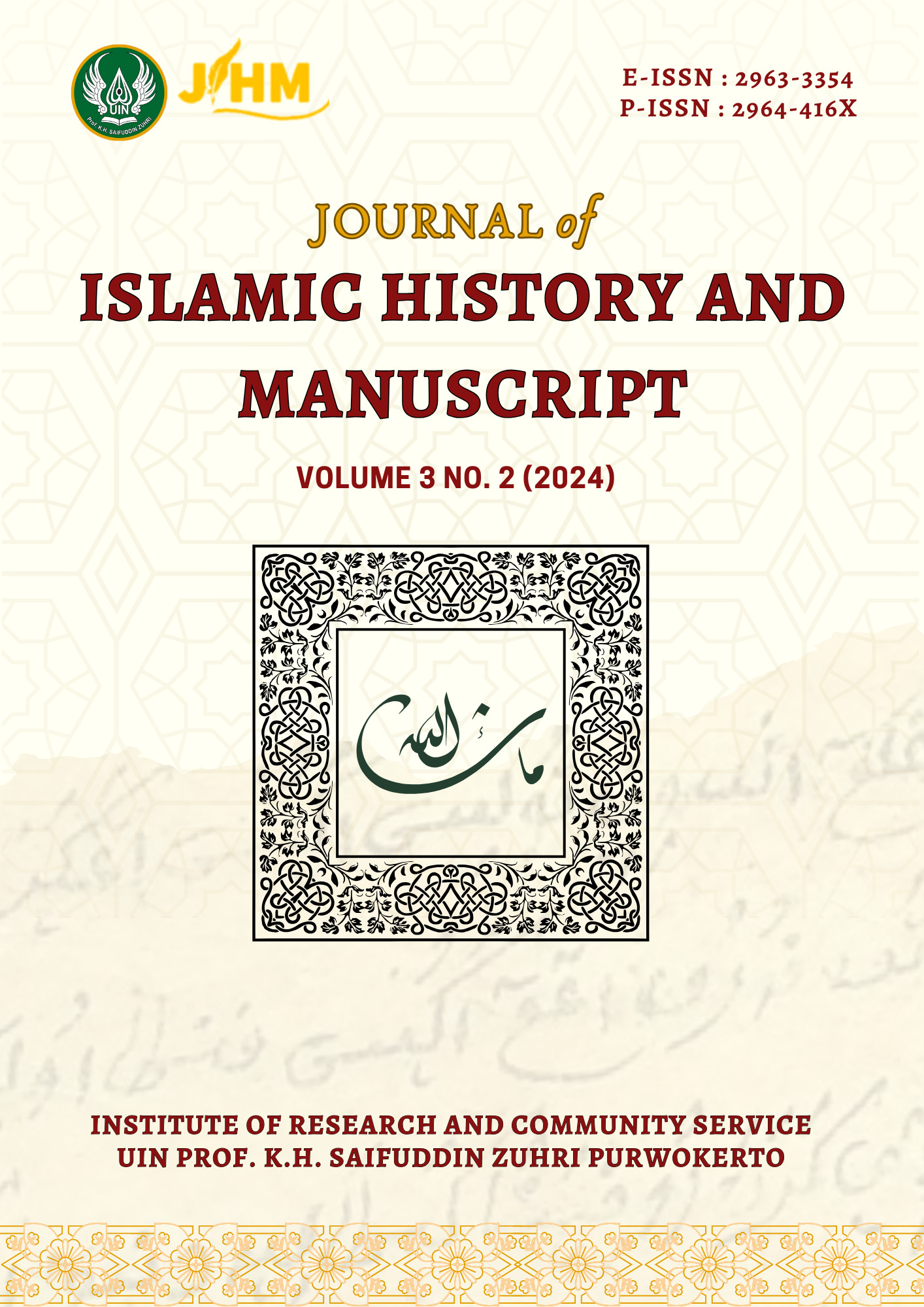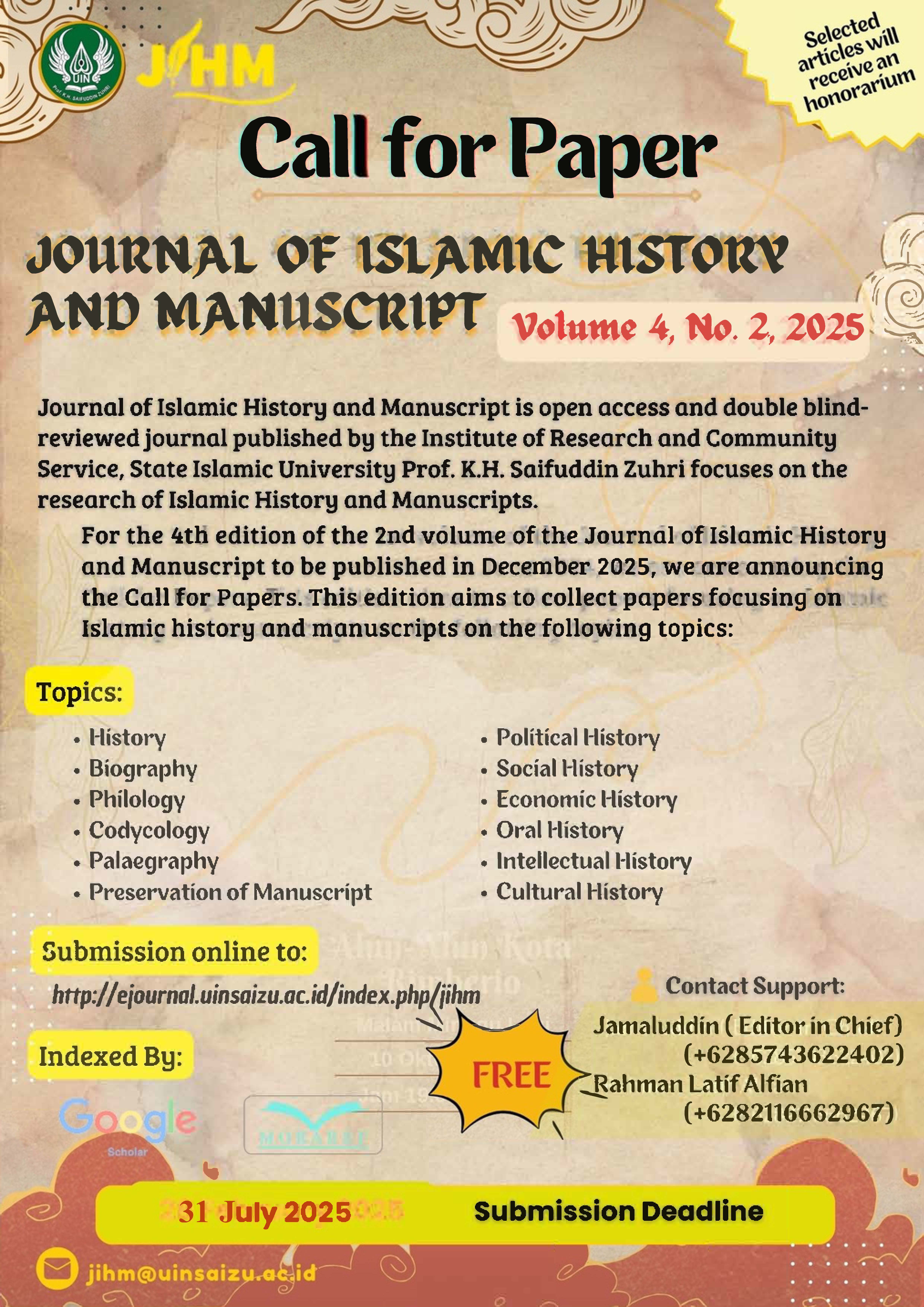The History of Iṣlāḥ al-Gazālī's Movement and Its Relevance to Contemporary Education Concept
DOI:
https://doi.org/10.24090/jihm.v3i2.10726Keywords:
al-Gazali, islah, Salahuddin al-Ayyubi, Education, ContemporaryAbstract
The aim of this research is to understand the history of the islāḥ al-Gazālī movement and its relevance to the concept of contemporary education. This research method is qualitative-descriptive, using library research techniques and historical and sociological approaches. The findings indicate that al-Gazālī started the islāḥ movement by repairing himself first. Further, al-Gazāli diagnosed the problems faced by the Islamic community and found that the quality of society, good or bad, depended on the knowledge and credibility of scholars. Based on this diagnosis, al-Gazālī took improvement measures by including: producing a new generation of scholars and educators; designing educational systems and curricula in accordance with Islamic principles; reviving the mission of al-‘amr bi al-ma’rūf wa al-nahyī ‘an al-munkar; and fighting for social justice. Al-Gazālī's thoughts and actions played a crucial role in the process of reform and renewal in society, which produced the generation of Ṣalāḥuddīn al-Ayyūbī through reform of thought and education. In today's context, al-Gazālī's thought and movement suggest that the problem of Islam needs to be overcome from its root, namely "moral reform". The role of the scholar and the leader of the people are the two main elements that support the survival of the people, and both of these aspects should get serious attention.References
Al-Din, A. al-Q. S. (1997). Al-Raudatain fi Akhbari al-Daulatain. Bairut: Mu’assasah al-Risalah.
Al-Dzahaby, S. al-D. (2004). Siyar A’lam al-Anbiya. Bairut: Mu’assasah al-Risalah.
Al-Ghazali, M. bin M. bin M. (2005). Ihya’ ‘Ulum al-Din. Dar Ibnu Hazm.
al-Kilani, M. I. (2019). Model Kebangkitan Umat Islam: Upaya 50 Tahun Gerakan Pendidikan Melahirkan Generasi Shalahuddin dan Merebut Palestina (1st ed.; Yudha Hidayat, Ed.). Depok: Mahdara Publishing.
Al-Naisaburi, M. bin al-Hajjaj al-Q. (1955). Sahih Muslim. Dar al-Kutub al-‘Arabiyyah al-Kubra.
Al-Sadafi, Salah al-Din Khalil. (2000). Al-Wafi bilwafayat. Bairut: Dar Ihya’ al-Turas.
Al-Subki, T. al-D. ‘Abd al-W. bin T. al-D. (1993). Tabaqat al-Syafi’iyyah al-Kubra. Hajru Littiba’ah wa al-Nasyr wal-Tauzi’.
Al-Suyuti, ‘Abd al-Rahman bin Abi Bakr Jalal al-Din. (1967). Husn al-Muhadarah fi Tarikh Misr wa al-Qahirah. Misr: Dar Ihya’ al-Kutub al’Arabiyyah.
Al Kilani, M. I. (2007). Misteri Masa Kelam Islam dan Kemenangan Perang Salib. Bekasi.
Ash-Shallabi, A. M. (2013). Shalahuddin Al-Ayyubi: Pahlawan Islam Pembebas Baitul Maqdis. Pustaka Al-Kautsar.
Choiriyah, C. (2020). Peranan Kepemimpinan Dakwah Dalam Melaksanakan Amar Ma’ruf Nahi Munkar. Yonetim: Jurnal Manajemen Dakwah, 3(01), 1–16. Retrieved from http://jurnal.radenfatah.ac.id/index.php/yonetim/article/view/6119
Haryanto, S. (2017). Pendekatan Historis Dalam Studi Islam. Manarul Qur’an: Jurnal Ilmiah Studi Islam, 17(1), 127–135. Retrieved from https://ojs.unsiq.ac.id/index.php/mq/article/download/927/498.
Hasib, K. (2017a). Konsep Siyasah dan Adab Bernegara Menurut Imam Al-Ghazali. FALASIFA: Jurnal Studi Keislaman, 8(1), 1–16. doi: https://doi.org/10.36835/falasifa.v8i1.35
Hasib, K. (2017b). Tasawuf Dan Reformasi Umat Berdasarkan Pemikiran Imam al-Ghazali. Al-Rasῑkh: Jurnal Hukum Islam, 6(02), 83–99. doi: https://doi.org/10.38073/rasikh.v6i02.58
Hasyim, M. S. (2005). Al-Asy’ariyah (Studi Tentang Pemikiran Al-Baqillani, Al-Juwaini, Al-Ghazali). HUNAFA: Jurnal Studia Islamika, 2(3), 209–224. doi: https://doi.org/10.24239/jsi.v2i3.317.209-224
Husaini, A. (2006). Hegemoni Kristen-Barat dalam studi Islam di perguruan tinggi. Gema insani.
John, W. C. (2013). Research Design Pendekatan Kualitatif, Kuantitatif dan Mixed. Yogyakarta: Pustaka Pelajar.
Kurniawan, Y. (2018). Hubungan Ulama Dengan Umara’menurut Imam Al-Ghazali Dan Relevansinya Di Indonesia. UIN Raden Intan Lampung. Retrieved from http://repository.radenintan.ac.id/id/eprint/4732.
Parrott, J. (2017). Al-Ghazali and the Golden Rule: Ethics of Reciprocity in the Works of a Muslim Sage. Journal of Religious & Theological Information, 16(2), 68–78. doi: https://doi.org/10.1080/10477845.2017.1281067
Rifa’i, M. (2018). Kajian Masyarakat Beragama Perspektif Pendekatan Sosiologis. Al-Tanzim: Jurnal Manajemen Pendidikan Islam, 2(1), 23–35. Retrieved from https://ejournal.unuja.ac.id/index.php/al-tanzim/article/view/246.
Rohmatika, R. V. (2019). Pendekatan Interdisipliner dan Multidisipliner Dalam Studi Islam. Al-Adyan: Jurnal Studi Lintas Agama, 14(1), 115–132.
Santoso, I. R. (2019). Konsep Marketing Berbasis Maqoshid Al-syari’i Imam Al-Ghazali. Jurnal Ilmiah Ekonomi Islam, 5(3), 157–165. doi: http://dx.doi.org/10.29040/jiei.v5i3.557
Sholehah, B., & Muali, C. (2018). Pendidikan Akhlak Perspektif Al-Ghazali. At-Tajdid: Jurnal Ilmu Tarbiyah, 7(2), 190–205.
Suhaimi, A. (2019). Concept of idealism philosophy in Islamic education according to imam Al-Ghozali. Utopia y Praxis Latinoamericana, 24, 359–369. doi: http://orcid.org/0000-0001-8337-3598
Syafril, S. (2017). Pemikiran Sufistik: Mengenal Biografi Intelektual Imam Al-Ghazali. SYAHADAH: Jurnal Ilmu Al-Qur’an Dan Keislaman, 5(2). doi: https://doi.org/10.32520/syhd.v5i2.184
Zamzamy, M. B., Manurung, N. S., & Irfani, F. (2019). Gerakan Da’wah Ishlah Imam Al-Ghazali Dan Pengaruhnya Dalam Sejarah Lahirnya Gerakan Shalahuddin Al-Ayyubi. Komunika: Journal of Communication Science and Islamic Da’wah, 2(2), 93–104. doi: http://dx.doi.org/10.32832/komunika.v2i2.4615
Downloads
Published
How to Cite
Issue
Section
License
Copyright (c) 2024 Azwar Azwar, Muhammad Ikhsan

This work is licensed under a Creative Commons Attribution 4.0 International License.
Authors who publish in this journal agree to the following terms:
- Authors retain copyright and grant the journal right of first publication with the work simultaneously licensed under a Creative Commons Attribution 4.0 International License. that allows others to share the work with an acknowledgment of the work's authorship and initial publication in this journal.
- Authors can enter into separate, additional contractual arrangements for the non-exclusive distribution of the journal's published version of the work (e.g., post it to an institutional repository or publish it in a book), with an acknowledgment of its initial publication in this journal.
- Authors are permitted and encouraged to post their work online (e.g., in institutional repositories or on their website) before and during the submission process, as it can lead to productive exchanges and earlier and greater citation of published work (See The Effect of Open Access).

















